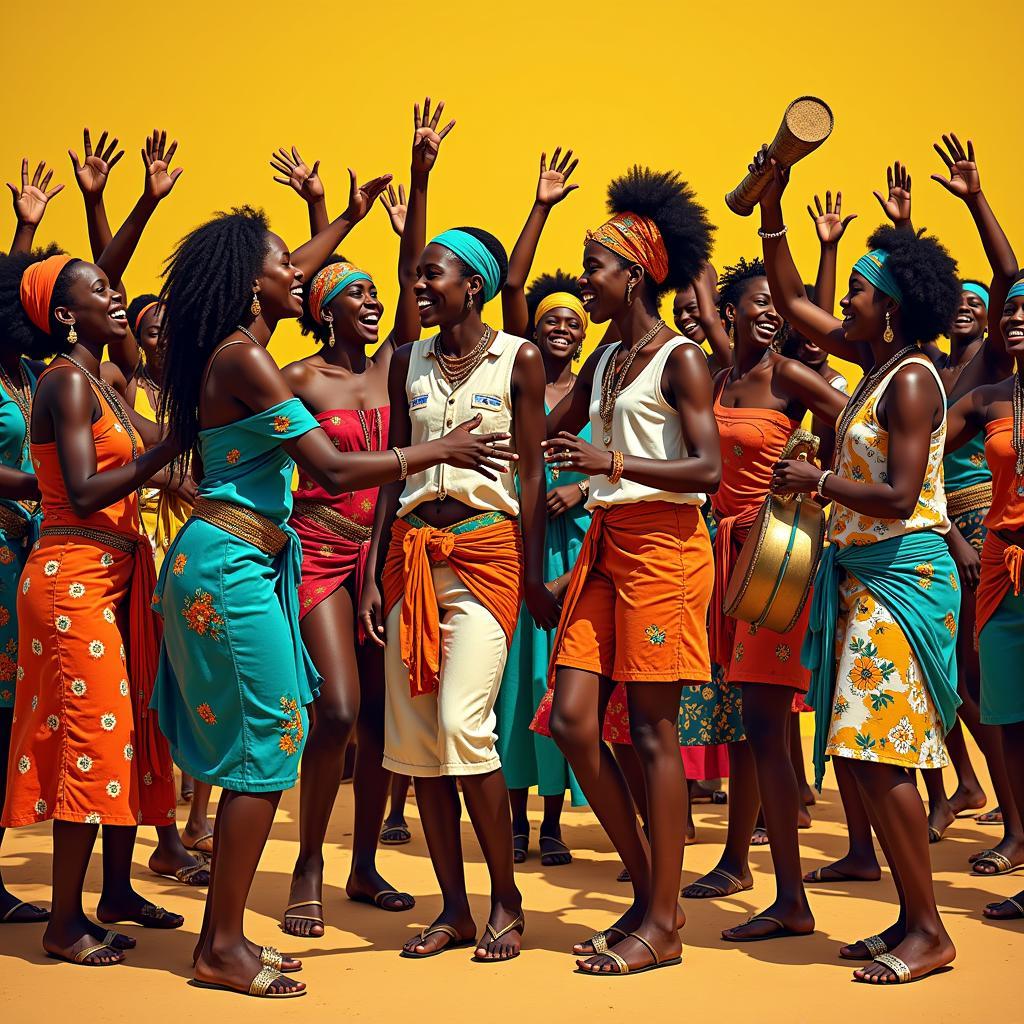Unveiling the Magic of African Cultures
Africa, a continent brimming with vibrant cultures and captivating traditions, beckons exploration. From ancient rituals to modern artistic expressions, African cultures weave a tapestry of diversity that reflects the continent’s rich history and captivating landscapes. Join us on a journey as we delve into the heart of what makes Africa so unique, exploring its captivating countries and their mesmerizing traditions.
A Kaleidoscope of Cultural Expressions
African cultures are anything but monolithic. Instead, they represent a stunning mosaic of over 3,000 distinct ethnic groups, each contributing to the continent’s rich heritage. These cultures are vividly expressed through a symphony of art forms, languages, music, and dance, creating a vibrant tapestry that celebrates the human spirit.
 African music and dance celebration
African music and dance celebration
Music, for instance, serves as a universal language, conveying emotions, stories, and traditions across generations. From the rhythmic beats of West African drumming to the soulful melodies of East African singers, each region boasts its own distinct soundscape. Dance, often intertwined with music, plays an equally significant role, serving as a powerful form of storytelling, ritualistic expression, and social bonding.
The Enduring Legacy of African Art
African art transcends mere aesthetics, serving as a powerful conduit for storytelling, spiritual beliefs, and societal values. From the intricate carvings of West Africa to the colorful beadwork of East Africa, each piece whispers tales of the past, reflects the present, and offers glimpses into the future.
One striking example is the ubiquitous presence of masks in many African cultures. Far from mere decorations, masks hold deep spiritual significance, often embodying ancestral spirits or deities. They are used in rituals, ceremonies, and performances, serving as powerful intermediaries between the physical and spiritual realms.
The Tapestry of Traditions
From birth to death, life in Africa is punctuated by a rich tapestry of traditions and rituals that provide meaning and structure to daily existence. These customs, passed down through generations, offer a window into the values, beliefs, and social structures that shape African societies.
 African family gathering for a traditional meal
African family gathering for a traditional meal
Family, for instance, holds paramount importance in most African cultures. Extended family networks provide a strong safety net, offering support, guidance, and a sense of belonging. Respect for elders is deeply ingrained, and their wisdom is highly valued in decision-making processes.
Exploring the Diversity of African Countries
Each of Africa’s 54 countries boasts its own unique cultural fingerprint, shaped by its history, geography, and people. From the bustling medinas of Morocco to the vast savannas of Tanzania, every corner of the continent offers a unique perspective on the African experience.
Conclusion
Exploring the diverse cultures of Africa is a journey that promises to enrich the soul and broaden the mind. Through its art, music, dance, and traditions, Africa invites us to celebrate the beauty of human diversity and appreciate the enduring power of culture to connect us all.
FAQ
1. What are some of the most widely spoken languages in Africa?
Some of the most widely spoken languages include Arabic, Swahili, Hausa, Yoruba, and Igbo.
2. What are some of the most popular traditional African dishes?
Popular dishes include Jollof Rice (West Africa), Nyama Choma (East Africa), and Piri-Piri Chicken (Southern Africa).
3. What are some important things to remember when interacting with people from different African cultures?
Respect for elders is paramount. It’s also essential to be mindful of cultural sensitivities, such as asking before taking photographs of people or sacred sites.
Need Help Exploring Africa?
We’re here to help you experience the magic of Africa! Contact us at:
Phone: +255768904061
Email: kaka.mag@gmail.com
Address: Mbarali DC Mawindi, Kangaga, Tanzania
Our team is available 24/7 to assist you.

